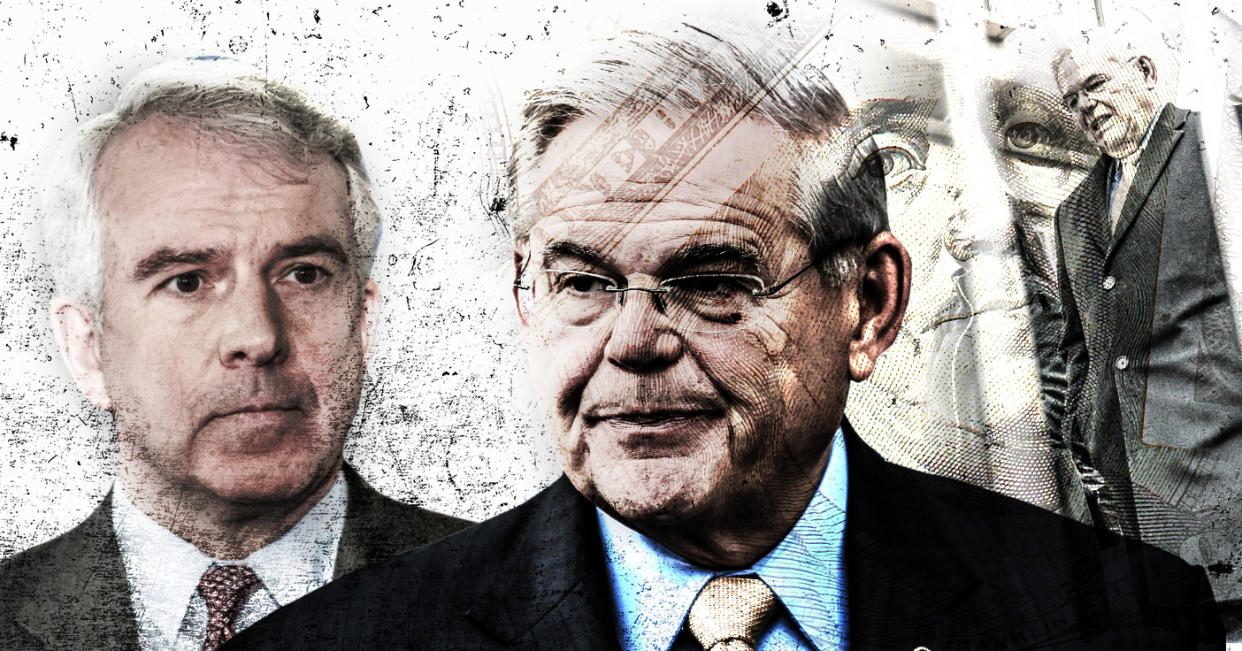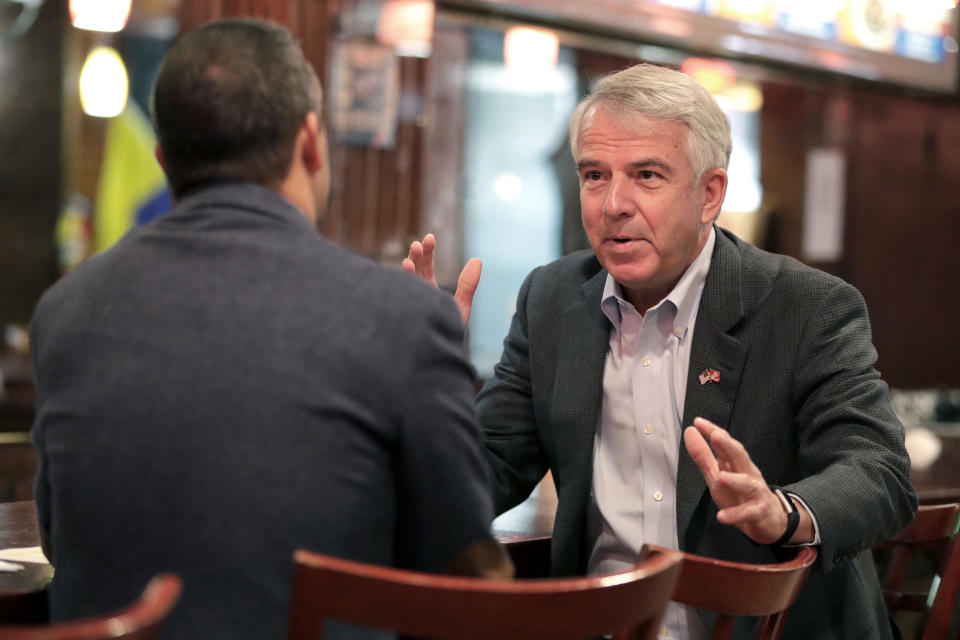Menendez race pits ethical concerns against party loyalty, and loyalty is winning

One of the big questions of Donald Trump’s presidency is whether the norms he routinely shatters still apply to other politicians.
Ethical standards are a good test. So far, six of Trump’s former aides or associates have pleaded guilty to federal charges: making false statements to the FBI, violating campaign-finance law, conspiring against the United States. Dozens of indictments have been handed up. And barely a week goes by without another report about some potential crime that Trump himself may have committed.
Yet his supporters are unfazed.
Is this a Trump-only phenomenon — a priced-in part of his persona? Or has two years of living under such a peculiar presidency numbed the electorate to offenses that might have crippled earlier candidates?
That proposition will be tested in several places on Nov. 6, from California’s 50th Congressional District, east of San Diego, where Republican Rep. Duncan Hunter was indicted earlier this year for allegedly misspending more than $250,000 in campaign funds, to New York’s 27th District, between Buffalo and Rochester, where Republican Rep. Chris Collins was indicted on charges of insider trading.

But by far the best case study will be New Jersey’s heated Senate contest. The reason is simple. In California and New York, the candidates accused of corruption are Republicans — and Republican voters have already proven by their loyalty to Trump that they’re willing to overlook ethical concerns about their candidates. (Indeed, both Hunter and Collins are currently favored to win reelection.)
To figure out whether the Age of Trump has also inured the broader populace to political malfeasance, you’d need to see how Democrats, who have railed relentlessly against the president’s “corruption” this cycle, react when accusations touch one of their own.
Enter Robert “Bob” Menendez, D-N.J. In 2015, Menendez — a senator since 2006 and a member of the House of Representatives for 13 years before that — was indicted on charges brought by Barack Obama’s Justice Department. The accusations stemmed from his relationship with a Florida doctor who gave him trips on his private plane and free nights in fancy Paris hotels, allegedly in exchange for various favors. Menendez was “severely admonished” by the Senate Ethics Committee. But his trial last year ended in a hung jury, and the Justice Department said in January that it was dropping the charges, freeing him to run for reelection. The doctor was convicted in a separate trial of Medicare fraud and sentenced to 17 years in prison.

Menendez’s Republican opponent, Bob Hugin, has — no surprise here — made the scandal the centerpiece of his campaign, blanketing New Jersey’s ultra-expensive airwaves with months of ads about how the state’s sitting senator is a “disgrace” who “broke federal law.”
So how’s that working out for him?
Not well enough, it seems. Polls taken in late August and September showed a tightening race, with Menendez ahead by an average of less than 5 percentage points. (Last time around, the senator won reelection in the mostly Democratic state by nearly 20 points.) The Democratic Senate Majority PAC stepped in, investing $3 million in the race to bolster Menendez’s chances.
Yet in recent weeks the polling gap between Menendez and Hugin has grown. Three of the four latest nonpartisan polls show the incumbent clearing the crucial 50-percent mark, and his average lead had doubled to nearly 10 percentage points. The data journalists at FiveThirtyEight currently give Menendez a 91 percent chance of victory.
According to Monmouth University’s Patrick Murray, the most respected political pollster in New Jersey, there are two reasons why Menendez is pulling away. The first is that for most of the year, “Hugin had the field to himself.” A retired Marine and the chairman and former CEO of Celgene, a global biotech company, Hugin spent a staggering $22,710,231 through the third quarter of 2018 — all while giving his own campaign an even more staggering $24 million. At the same time, Menendez, who has raised about $11 million to date, husbanded his resources for much of the summer and barely even campaigned.

“Polling last year showed that voters here knew what was going on with Menendez’s trial, but it wasn’t central,” says Murray. “What Hugin was able to do with all his early advertising and spending was to elevate it in importance. He got voters thinking, ‘Maybe Menendez’s ethics problems should be more of a factor in my choice.’”
That trend started to reverse around Labor Day, however, when the incumbent’s first ad finally appeared on New Jersey TV. “I never forgot my roots — he has,” Menendez said onscreen, referring to his opponent. “I’m fighting for equal pay and affordable health care; he’s for corporate tax breaks. I’m working to lower prescription costs; Hugin gouged cancer patients. And I’m standing up to Donald Trump. He donated hundreds of thousands to him.”
Since then, Menendez has hammered at the same message again and again: I’m a working-class Democrat; he’s a rich Trump Republican.
Hugin was previously a Trump delegate to the 2016 Republican National Convention, finance chairman for Trump’s New Jersey campaign and a major Trump donor. But in the campaign he has distanced himself from the national GOP by criticizing Trump’s tax bill, which is widely unpopular in states like New Jersey with high local taxes, and emphasizing his support for a bevy of moderate proposals opposed by the president: universal gun background checks, marijuana decriminalization, LGBTQ rights, abortion rights and “comprehensive and compassionate immigration reform.”
Seeking to escape Trump’s unpopularity in blue states, Hugin told NBC News: “This race is Bob Hugin versus Bob Menendez. This is a New Jersey race.”
As Election Day approaches, Menendez has sought to muddy the waters on ethics. Earlier this month, for instance, the senator briefly returned from Washington, D.C., for a press conference in a cramped Harrison, N.J., doctor’s office, where he excoriated Hugin for Celgene’s successful efforts to block lower-cost generic alternatives to its Revlimid cancer drug and its decision to settle, to the tune of $280 million, a so-called whistleblower lawsuit that charged the company with submitting false claims to Medicare and 28 state health care programs. (Hugin and Celgene deny any wrongdoing.)

“Voters need to know Republican Bob Hugin is the poster child for a greedy pharmaceutical executive,” Menendez told reporters as he waved the settlement in the air for dramatic effect. “Bob Hugin is a fraud.”
The senator then went on to repeat the word “fraud” at least eight more times, in case anyone missed his point.
All of which brings us to the second reason Menendez is likely to win on Election Day.
“Partisan tribalism,” says Murray. “It’s just such an incredible force right now on so many different issues. We’ve never seen electorate so dug in. There are basically no issues that can persuade people to cross over to the other side anymore — including ethics and corruption.”
It’s not that Menendez’s alleged lapses haven’t hurt him with New Jerseyans, explains Murray. They have. “If Menendez did not have this baggage,” the pollster says, “he would be ahead by 20 points.” The senator’s latest Monmouth poll numbers reflect the damage, showing that a mere 28 percent of voters now view him in a favorable light (compared to 45 percent who view him unfavorably and 27 percent who offer no opinion).

Those stats alone would usually be enough to sink an incumbent. But not, it seems, in 2018.
“Once we turned the corner past Labor Day,” Murray says, “the national environment took hold.”
The result? A majority of New Jersey voters (56 percent in the Monmouth poll) now say that their views of Trump — who commands a 55 percent disapproval rating in the state — are more important than their views of Menendez (31 percent), while an even larger majority (64 percent) says that Menendez’s behavior was no worse than other politicians’. Overall, Menendez leads by nine points among likely voters (49 percent to 40 percent) and 11 points in a scenario that incorporates increased Democratic turnout.
In other words, at a time when ethics troubles seem more prevalent than ever, particularly at the presidential level, New Jersey is poised to prove that they aren’t the stumbling block they once were. In fact, on this issue, Democrats and Republicans may have more in common than they think.
_____
Read more Yahoo News midterms coverage:
Red-tide awakening: How Florida’s environmental woes could hurt Rick Scott
‘Outside agitators’ phrase resurfaces in Georgia governor’s race
In Texas Senate race, Betomania confronts Trump’s MAGA-rally for Cruz
In Senate race, GOP Rep. Blackburn accuses her opponent of being a Democrat
Photos: Honduran migrant caravan pushes north toward the U.S.



